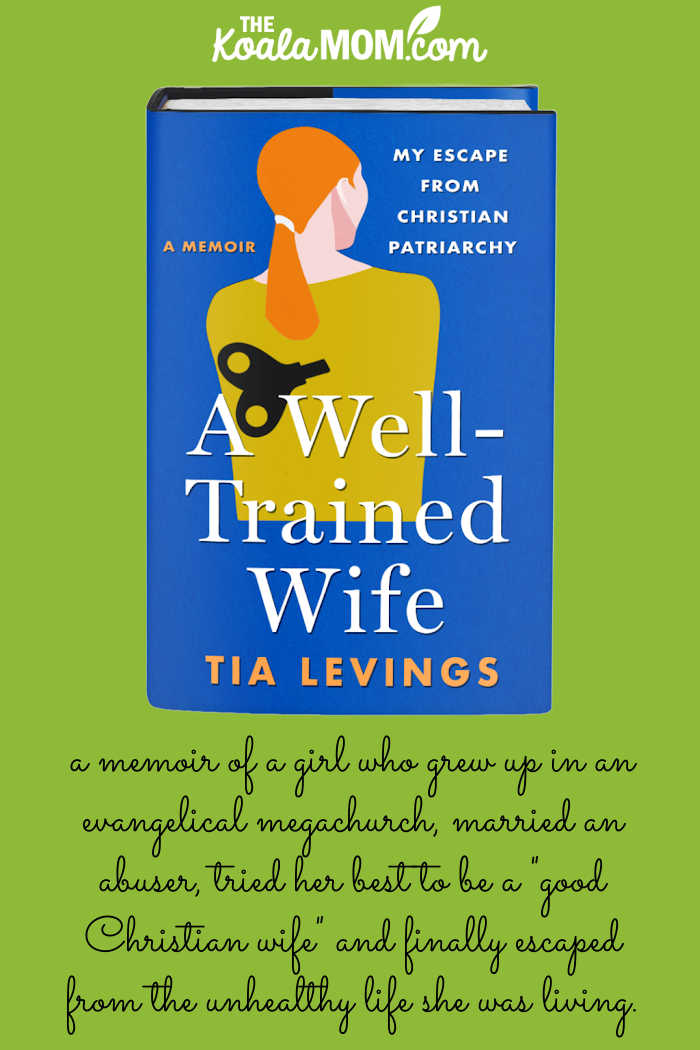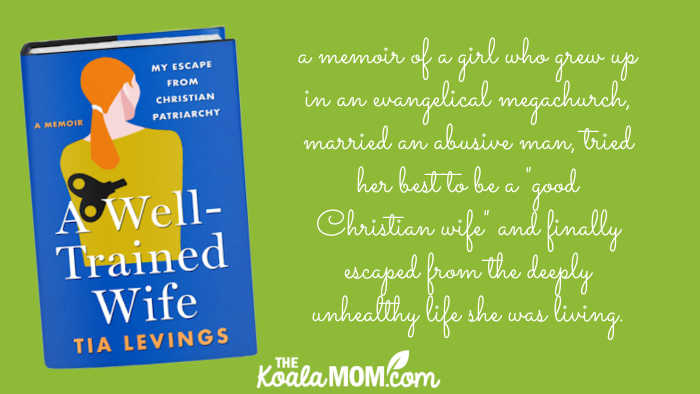I’ve spent a lot of time over the past four years deconstructing “biblical” and “Christian” teachings I heard during my childhood, which negatively affected my marriage and adult years. When a friend of mine sent me an article about Tia Levings, I felt as thought I’d found a new best friend. I poured over Tia’s website and debated adding her book to my next Amazon order. Then, while speed walking through the library to find a DVD for my teenager, a blue cover caught my eye. Without breaking stride, I nabbed The Well-Trained Wife off the shelf and spent the next week binge-reading it.
A Well-Trained Wife: My Escape from Christian Patriachy is a memoir of a girl who grew up in an evangelical megachurch, married an abusive man, tried her best to be a “good Christian wife” for years, and finally escaped from the deeply unhealthy life she was living. As she found healing and wholeness, Tia also began sharing her story, confronting the views and ideas that kept her trapped for so long. She’s been featured on Amazon’s documentary Shiny Happy People and also has a podcast.

This post contains affiliate links; as an Amazon associate, I earn from qualifying purchases.
A Well-Trained Wife overview
Tia’s story begins at age ten, when her family leaves a rural life in the northern US to move to urban Florida. There, they begin attending an evangelical megachurch. Tia is sent to Christian schools that reinforce the views taught at her church. Throughout her teen years, she struggles with pleasing her parents, her church, and her friends, while also trying to figure out who she is. Her dreams of pursuing studies in writing or art are shot down by her parents and church, who only support boys’ ambitions, as girls are supposed to be wives and mothers.
There are red flags in Tia’s relationship with Allen from the very beginning, but she pushes these down, believing love with fix everything. Soon, she is a mom raising her kids and writing on the side. The loss of her third daughter, Clara, as an infant deeply impacts her. When their family moves across the US, they find a new church community. Tia once again struggles to follow the rules here, to fit in with the image of a good Christian wife that’s held out to her. When she and her husband begin to explore other churches, Tia tiptoes into a local Orthodox church and discovers a new world… and a faith that’s not based on rules.
Levings describes Allan’s escalation from one strict congregation to another, like an addict perpetually seeking a hit of stronger and stronger stuff, culminating in a hyper-conservative fundamentalist church in Tennessee. Levings recalls wearing a head covering for modesty at the urging of Allan, whom she was to refer to as “my lord”; submitting to discipline spankings; and, at the command of church elders, moving her flock of four homeschooled kids to a dangerously isolated mountain community. ~ The Washington Post
The end of Tia’s marriage comes suddenly and dramatically, with the help of her church. She returns to Florida with her children and begins to find healing after the abuse and trauma she’s lived in for so many years. Her children grow up and she finds a second chance at love, but also deals with health problems. At the end of her memoir, she finds new strength and hope in telling her story and connecting with other women who have been hurt by Christian patriarchal ideas.
My thoughts on Tia’s book
While the Lutheran and Catholic churches I’ve attended haven’t exerted the same control on my life as the churches Tia attended, other parts of our stories are similar. Like Tia, my family was involved with Bill Gothard’s Institute in Basic Life Principles. As Canadians, we were on the fringes of this organization, attending conferences each year via video so I never met Gothard in person. I recognized other names in Tia’s book as well, as other teachers who had influenced me with their skewed ideas about faith and God.
Tia’s book also sheds light on what abuse looks like. Too often, our society pictures abused women as those with black eyes and bruises, being knocked down by their drunken husbands. The truth is much different; most abusers are publicly charming, nice men and most abuse leaves no visible bruises. When Tia’s lawyer first handed her a book about abuse, she said she wasn’t battered because “Allan never once punched me in the face.” The abuse Tia lived with was subtle and confusing, soul-destroying and difficult to explain.
This is why so many women, like Tia, don’t recognize their own abuse until they are out of it: “I stared at the cover, recognizing the living-dead gaze of her eyeball. I knew that feeling–but my brain resisted matching my experience to ugly words like ‘battered’ and ‘abusive.’ When I got back to the camper in Florida, I read about cycles of abuse and invisible wounds. About rage and misplaced eroticism. Triggers. Remorse. Repentance. Patterns that played out in predictable sequences from the few months of my relationship with Allan.”
Tia’s openness about her struggles also helped me feel less alone in my own struggles. Often, in our pain, we close in on ourselves, feeling unseen and unheard, afraid to reach out for help, especially if our struggles are invisible, such as grief, mental health issues, or abuse. However, openly sharing our pain and losses can actually help connect us with others, and reaching out this way can be healing: “All I’d have to do to save that moment of discomfort is deny Clara’s existence… But every time I told her story, I opened space for someone else to share theirs. Mothers told me of their miscarriages and stillbirths, fathers told me of drowned toddlers and children with cancer. Grown siblings shared their lost brother or sister.”
Why does this memoir matter?
Tia says, “When Donald Trump ran for president and talked about grabbing women by the pussy, and then was lauded by Franklin Graham and Jerry Falwell Jr and called a man of God, and all the Christians of my youth on Facebook applauded him and voted for him, I knew my problem wasn’t with spirituality or the divine. It was with the systems and personalities who’d sought to gain control and power in Jesus’s name, amen.”
Here in North America, we live in a system of patriarchy that is being enforced by so-called “Christian” beliefs and values. Tia’s story shows what those patriarchal ideas look like when they are lived out in the family. It’s a scary picture. For any woman in an abusive relationship, for any woman being treated badly at work or school or anywhere else, it’s hard to hold onto hope for a better world when those who lead our country are openly abusive and not being held accountable for it.
Abuse is a growing epidemic in our society. The stats on domestic violence in either Canada or the USA are scary–it is highly likely that someone you know is being abused by her partner, whether or not she recognizes it herself. A Well-Trained Wife is an eye-opening read about what abuse looks like within a Christian marriage and community. It’s a cry for help, a beacon for those struggling in such relationships, and a plea to every Christian to stop spreading harmful teachings, patriarchal, unbiblical teachings.

More about Tia Levings
Tia Levings is a former tradwife and Christian fundamentalist dedicated to shining a spotlight on the realities of high-control religion and church-sanctioned domestic abuse and to the support of her fellow survivors. She is the mom of five children (including one in heaven). She shares videos on what it’s really like to live in Christian fundamentalism and is also a speaker, podcaster, and writer. A Well-Trained Wife is her first book. To find out more about Tia, visit her website.

No Responses Yet